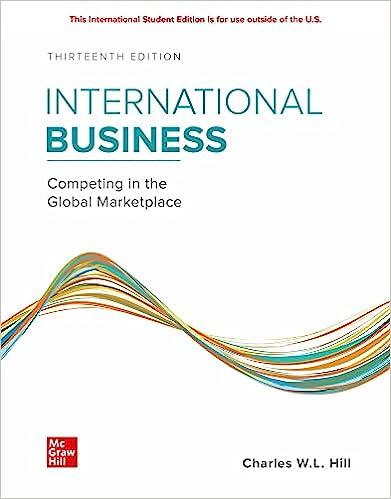Corporate Knights, a research firm from Toronto, Canada, puts together the Global 100, a ranking of the
Question:
For several years, Natura & Co SA from Brazil has been among the world’s leaders, regularly ranking in the Top 20 each year. This is an incredibly admirable feat, because Natura is also the world’s largest cosmetics company.
Cosmetics has a lot of potential to be less than sustainable in manufacturing and operations, but Natura has bucked that trend. Natura (naturaeco.com), headquartered in São Paulo, Brazil, was founded in 1969. The company has more than 18,000 employees and revenue of about $4.4 billion. Natura has three prominent subsidiaries that strive to be as sustainable in their operations as possible: Natura Cosmetics, The Body Shop, and Aesop. The latter two brands are often viewed as standalone organizations by customers.
Natura Cosmetics develops, produces, distributes, and sells cosmetics, fragrances, and hygiene products. Natura’s products include creams, deodorants, lipsticks, lotions, makeup accessories, perfumes, shampoos, shaving creams, soaps, and sunscreens, among others. Its portfolio is made up of brand names such as Amo, Ekos, Tododia, Aguas, Chronos, Erva Doce, Homem, Horus, Seve, and Luna. The company employs more than 7,000 people in seven countries: Brazil, Argentina, Chile, Mexico, Peru, Colombia, and France. Sustainable development has been Natura’s guiding principle since it was founded. Sustainability, along with a passion for Customer Relationship Management (CRM), led the company to adopt direct sales as its main commercial strategy. To support its direct sales model, more than 1,421,000 consultants around the world promote the company’s values and products directly to customers. To be sustainable, innovation is at the heart of Natura’s development policy. For example, last year the company spent about $75 million on product development, launching 164 products and achieving an innovation index of 64.8 percent (the percentage of revenue from products launched in the last two years).
The Body Shop is a well-known, formerly British cosmetics, skin care, and perfume company that was founded in 1976 by Anita and Gordon Roddick. The company offers more than 1,000 products, which it sells in some 3,100 owned and franchised stores in 66 countries. The Body Shop is still based in East Croydon and Littlehampton in the United Kingdom, but was bought from French cosmetics company L’Oréal (which owned The Body Shop from 2006 to 2017)
by Natura in June 2017 for $1.2 billion (£880 million). Famously, The Body Shop has been a leader in banning animal testing of cosmetics products worldwide since the 1980s and is tirelessly working to ban animal testing in the cosmetics industry. This position also feeds into its sustainability initiatives. Anita Roddick said that “My hope for the future of The Body Shop is primarily vested in those people who will be the custodians of our culture and values.”* This custodianship includes the pledge of being the world’s most ethical, sustainable company. For example, The Body Shop has unveiled an “Enrich Not Exploit” slogan that will underpin all aspects of its operations. This pioneering commitment reaffirmed the global cosmetics brand’s positioning as a leader in ethical and sustainable business practices.
Questions
1. With its three core companies (Natura Cosmetics, The Body Shop, and Aesop), Natura & Co SA blends three different business models for interacting with the customer. In the end, all three models are focused on sustainable business practices. What can other companies learn from Natura & Co SA on how to be sustainable?
2. The Body Shop has been a leader in banning animal testing of cosmetics products worldwide since the 1980s and is tirelessly working to ban animal testing in the cosmetics industry. Is this part of being sustainable or is animal testing a different focus?
3. Aesop is not using traditional advertisements or discount sales to promote its products. Instead, Aesop gets its promotional communication mostly by word-of-mouth for the design of its products, stores, and events, which are a singular mix of indulgent product experiences, thoughtful language, and modern minimalist design. If you had to interact with Natura & Co SA, which customer engagement model—Natura’s, The Body Shop’s, or Aesop’s— would be the best for you and why?
4. How much would it mean to you that a company operated in a sustainable way? Would you pay 5 percent, 10 percent , or 25 percent more for a product if the quality was the same as non-sustainable alternatives? What if the quality of the product was lower but the price the same?
Step by Step Answer:

ISE International Business Competing In The Global Marketplace
ISBN: 9781260575866
13th International Edition
Authors: Charles Hill





